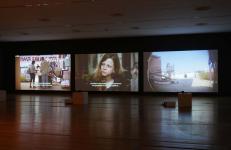A 4-channel video installation by Dario Azzellini and Oliver Ressler

Within the framework of the exhibition
„CONSTRUCTING THE WORLD: ART AND ECONOMY 1919-1939 AND 2008-2018: … this topical exhibition is the first to illustrate the economy’s dramatic influence on art and to make global comparisons, demonstrating these in an analysis of two separate eras“
Presents itself:
Occupy, Resist, Produce
A 4-channel video installation by Dario Azzellini and Oliver Ressler, 131 min. (combined), 2014 – 2018
The economic crisis that began in 2007-8 led to layoffs on a massive scale, leaving thousands of newly unemployed workers with little hope of another job. Their response put workers’ control back on the agenda in Europe. For many years beforehand, factories had been occupied and recuperated almost exclusively in Latin America.
In most cases an occupation is not a deliberate step towards workers' control but a means of workers' struggle against the closure of a production site or company or the relocation of production to another country. The struggles often fall apart without any concrete results. “Occupy, Resist, Produce” focuses on the rare, better organized cases where the purpose of the struggle is to bring production under workers’ control. The workers do more than protest, they take the initiative and become protagonists, building horizontal social relations on the production sites and adopting mechanisms of direct democracy and collective decision-making. The recuperated workplaces often reinvent themselves, building links with local communities and social movements.
The 4-channel video installation “Occupy, Resist, Produce” consists of four films on occupied factories in Milan, Rome, Thessaloniki and Gémenos. In these cases the workers did find ways to organize labor under their own control. Each film is based on discussion with the workers. The workers' assemblies – always the main decision-making bodies – were recorded. It is fundamental to recognize the differences between the situations, contexts and practices of the four worker-controlled companies, but it is also important to understand workers’ control or recuperation of workplaces as a socio-political action rather than a merely economic procedure.
Maflow, a transnational car parts producer based in Milan, closed its production facilities in 2009, with proprietor Italian Lifestyle Partners facing bankruptcy fraud charges. The workers began a struggle to reopen the plant under workers’ control. In 2013 they occupied the plant, and since that day 20 workers have participated full-time in the project, completely reinventing themselves and the factory, which they renamed RiMaflow. Applying the concept of an “open factory”, the workers started recycling computers and electronic household devices, opened a bar and cafeteria, and organized a flea market and cultural activities with the local community. They also built alliances with local organic agricultural producers, creating a group for solidarity shopping.
Officine Zero, formerly RSI (Rail Service Italia), once specialized in maintenance and repair of sleeping cars. When Italian railroads stopped running night trains in December 2011, RSI closed. Some 20 workers from a workforce of almost 60 refused to accept the closure, and in February 2012 they occupied their workplace. In 2013 Officine Zero was officially founded as an eco-social factory. Officine Zero literally means “Zero Workshops”: “zero bosses, zero exploitation, zero pollution”, as their new slogan puts it. In half a dozen workshops for carpentry, padding, metalwork and general repairs, the workers at Officine Zero focus mainly on the repair and recycling of domestic appliances, computers and furniture. The collective project aims to transform the former sleeping car repair shop into an industrial reuse and recycling center.
Vio.Me. in Thessaloniki used to produce industrial glue, insulant and various other chemically derived construction materials. In 2010 the workers were sent on unpaid leave every 4-6 weeks. After the owner stopped paying wages at all, in July 2011 the workers decided to occupy the plant and take their future into their own hands. In February 2013 Vio.Me. began producing organic cleaning products and organic soap. Vio.Me. formed a cooperative in order to operate legally. However, Vio.Me. does not operate as a traditional cooperative. The workers do not consider the company their property but a common good that should serve the community. Vio.Me. has “solidarity supporters” paying a monthly fee in advance and getting Vio.Me. products in exchange. The solidarity assembly also supports the workers' mobilizations.
Scop Ti is located in Gémenos near Marseille. The plant belonged to Lipton (Unilever) and produced herbal and fruit teas and the 120-year-old local French black tea brand Thé de l’Éléphant. In September 2010 Unilever closed the plant and left 182 workers without their jobs. The workers immediately occupied their workplace. The struggle relied on production, public protest, a solidarity campaign, and the legal struggle against Unilever. In May 2014 Unilever agreed to hand over the plant and the machines to the workers; moreover it paid a huge financial compensation enabling the workers to build their own cooperative and restart production. Scop Ti’s main brand is “1336,” referring to the number of days the workers’ struggle lasted. Existing wage differences were eliminated almost completely.
For the future it is planned to produce further films on occupied factories and to expand the video installation as the workers' struggles continue.
List of films:
“Occupy, Resist, Produce – RiMaflow”, 34 min., 2014
“Occupy, Resist, Produce – Officine Zero”, 33 min., 2015
“Occupy, Resist, Produce – Vio.Me.”, 30 min., 2015
“Occupy, Resist, Produce – Scop Ti”, 34 min., 2018
Directed and produced by Dario Azzellini and Oliver Ressler
Camera: Thomas Parb, Rudolf Gottsberger
Film editors: Dario Azzellini and Oliver Ressler
Sound design, re-recording mix and color correction: Rudolf Gottsberger
Special thanks to all the workers reclaiming work and dignity by building a democratic and self-determined workplace.
Footage: Giannis Girbas, Social Waste; Los Fralibos
The entire project was funded partly through the support of the Austrian Science Fund (FWF) AR 183-G21, Neuer Berliner Kunstverein (n.b.k.), Centro Andaluz de Arte Contemporáneo – CAAC, BKA, Kunsthalle Mannheim, Aktion Selbstbesteuerung, DIE LINKE im Europäischen Parlament, Stiftung Menschenwürde und Arbeitswelt and the Rosa Luxemburg Foundation.
Kunsthalle Mannheim | Friedrichsplatz 4, 68165 | Mannheim | Deutschland























